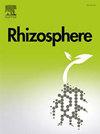可持续耕作方法提高了高粱根瘤土壤中细菌的多样性和营养水平
IF 3.4
3区 生物学
Q1 PLANT SCIENCES
引用次数: 0
摘要
本研究采用元基因组学分析方法,探讨高粱根瘤土壤中细菌多样性对各种可持续耕作方式的响应及其对土壤肥力的影响。棉花-高粱种植系统的田间试验自 2020 年开始,从第三周期的高粱试验中采集了土壤,并进行了元基因组学和养分可用性分析。我们评估了不同耕作方式的影响:我们评估了不同耕作方式的影响:自然耕作(NF)、有机耕作(OF)、作物综合管理(ICM)以及对照组(无投入耕作)。结果表明,在所有耕作方式中,蛋白菌门都很普遍,而放线菌、类杆菌和固着菌则由于土壤管理的改变和养分供应的变化而有所增加。属一级的分析表明,在不同的耕作方式中,优势菌属发生了变化,包括醋酸杆菌属、鞘氨单胞菌属、芽孢杆菌属和亚硝化细菌属。收获后的土壤分析表明,土壤养分水平各不相同,其中 ICM 提高了氮、磷和钾的可用性。ICM 采用有机肥和无机肥的均衡组合,促进了高粱的生长,与 OF 和 NF 相比,ICM 的植株高度和总干物质产量更高,而 OF 和 NF 的表现类似。这项研究强调了 ICM 等均衡方法在提高作物产量和土壤养分供应方面的功效。然而,与对照组相比,所有多样化耕作方法都表现出较高的土壤生物多样性,这突出表明有必要对不同耕作方法进行持续的长期土壤监测,以稳定土壤微生物群,确保养分供应,支持作物的可持续生产。本文章由计算机程序翻译,如有差异,请以英文原文为准。
Sustainable farming practices enhance bacterial diversity and nutrient levels in sorghum rhizosphere soil
This research employs metagenomic analysis to explore bacterial diversity in sorghum rhizosphere soil in response to various sustainable farming practices and their impact on soil fertility. The field experiment with cotton-sorghum cropping system was conducted since 2020 and from 3rd cycle sorghum experiment, the soils were collected and subjected to metagenomics and nutrients availability analysis. We evaluated the impact of different farming approaches: Natural Farming (NF), Organic Farming (OF), integrated crop management (ICM), along with a control (No input farming). The results underscores the prevalence of Proteobacteria phylum across all farming practices, while Actinobacteria, Bacteroidetes and Firmicutes showed increased presence due to altered soil management and nutrient availability changes. Genus-level analysis revealed shifts in dominant genera, including Acinetobacter, Sphingomonas, Bacillus, and Candidatus nitrososphaera, across different farming practices. Post-harvest soil analysis indicated varied nutrient levels, with ICM showing enhanced nitrogen, phosphorus, and potassium availability. ICM, utilizing a balanced mix of organic and inorganic fertilizers, promoted sorghum growth, yielding higher plant height and total dry matter compared to OF and NF, which performed similarly. The study emphasizes the efficacy of a balanced approach like ICM for improving crop production and soil nutrient availability. However, all diversified farming practices exhibited high soil biological diversity compared to the control, highlighting the necessity for continuous long-term soil monitoring across different farming practices to stabilize soil microbiomes, ensure nutrient availability, and support sustainable crop production.
求助全文
通过发布文献求助,成功后即可免费获取论文全文。
去求助
来源期刊

Rhizosphere
Agricultural and Biological Sciences-Agronomy and Crop Science
CiteScore
5.70
自引率
8.10%
发文量
155
审稿时长
29 days
期刊介绍:
Rhizosphere aims to advance the frontier of our understanding of plant-soil interactions. Rhizosphere is a multidisciplinary journal that publishes research on the interactions between plant roots, soil organisms, nutrients, and water. Except carbon fixation by photosynthesis, plants obtain all other elements primarily from soil through roots.
We are beginning to understand how communications at the rhizosphere, with soil organisms and other plant species, affect root exudates and nutrient uptake. This rapidly evolving subject utilizes molecular biology and genomic tools, food web or community structure manipulations, high performance liquid chromatography, isotopic analysis, diverse spectroscopic analytics, tomography and other microscopy, complex statistical and modeling tools.
 求助内容:
求助内容: 应助结果提醒方式:
应助结果提醒方式:


